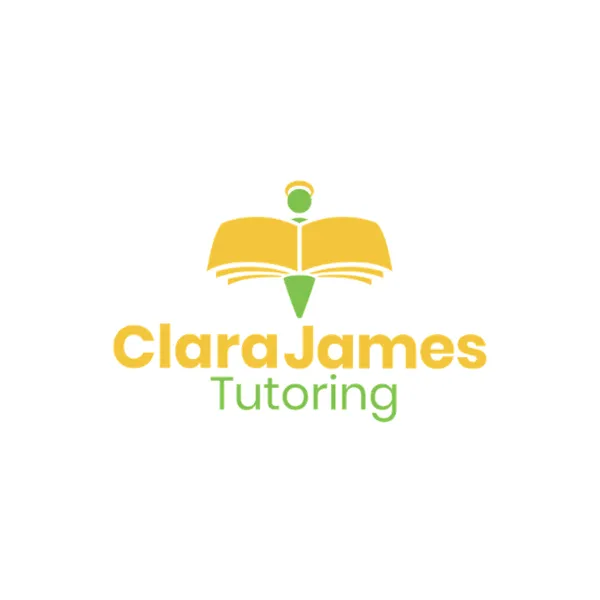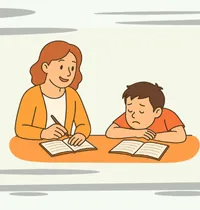
I’m looking for, gentle strategies
For many reasons some children lack confidence in their educational skills. This may be because previously they were taught in a way that didn’t compliment their learning style, it may be because they found it harder than others to grasp some of the initial concepts.
It may be for no other reason than their own self-belief. They felt that everyone else around them “got it” and they didn’t which in turn slowly ate away at their self-confidence.
If you'd rather watch a video version of the article click here
So, how can we help them to rebuild their confidence in themselves?
🧡 Start with strengths
When a parent gets in touch with us, I always suggest that we start with something just below their level of ability. This way we can give them the confidence that they can do it, making them more certain that they will be able to do the next thing as well.
If we start by giving them a challenge, in the hope that they do achieve it and prove how capable they are, we are potentially setting them up for a fall. Start in their comfort zone, give them any support that they need, and you will hopefully see their confidence slowly awaken.
It can take time, but one small step, reassurance and appropriate praise and you will slowly start to see it happen.
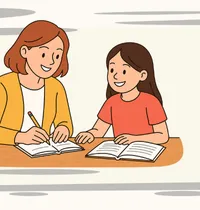
Giving children a task just below their zone of confidence will reassure them that they can achieve and understand.
Make it fun
Focus on what they enjoy or do well
Focus on what they enjoy or do well, even if it’s not academic (e.g. Lego, drawing, storytelling, kindness). What you can do is build this into the subject. For example, in English we have a game called “funny pictures” it’s the one where the first person draws the head, you then turn the paper over, and the next person draws the body. Hand it back to the first person to draw the legs and feet.
Open it up and you are left with some form of strange character. Next, we take it in turns to roll a dice. This determines the type of sentence we need to write. For example, if we are practicing punctuation a one might state we have to write a sentence using a full stop. A 2 might dictate that we write a sentence that includes a comma. Number 3 might ask us to use a capital letter.
The game can also be adjusted so that a 1 requires us to write a sentence that uses 2 adjectives. A 2 might request that we write a sentence using alliteration, 3 might be a proper noun, etc.
In maths you might incorporate smarties to use in working out fractions of quantities. There are 20 smarties, 6 are blue, so 6/20 are blue smarties. Then give them the smarties as a reward at the end.
🙋♀️ Let them be the teacher
Let them teach you something.
This flips the power dynamic and reminds them they can succeed.
It may be something that you have been explaining to them and now (no pressure) they have to pretend that you are the student (and not a very bright one) so they need to break it right down and explain it back to you.
This serves two purposes. If they do it, huge congratulations because it proves they get it. If they can’t it will highlight where they stopped getting it. Where you potentially stopped explaining it clearly and how you need to pick it up again and explain it in a way that does make sense to them.
As educators in whatever guise, I think it is always paramount to remember that it is not normally the child who is incapable of understanding, it is our inability to explain things in a way that makes sense to them. They can only ever be as strong as our ability to explain.
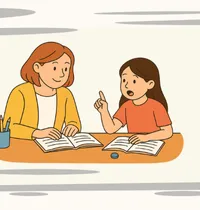
Let the child explain it back to you, it will help their confidence and understanding and highlight any areas that you need to make clearer
💬 Use language that encourages effort, not just outcomes
The language that we use is crucial. It can completely destroy a child’s confidence, even just an off-hand comment. A simple comment, or a roll of the eyes can completely shatter a child’s self-belief:
I remember as a child sitting in a maths class and the teacher was explaining something to us. I had no idea what she was talking about and, unfortunately, she chose me to answer her question.
I sat and looked at her blankly before giving her an answer with only the slightest glimmer of hope that it might be right.
No chance. She explained it again using the exact same words. She asked me again for the answer, but I was none the wiser. She might as well have been talking in a foreign language. I had no clue.
With a roll of her eyes, she explained it for the third time in the exact the same way. I still had no idea what she was on about. But, now with a bright red face and a fear that the tears I could feel welling up inside would escape down my cheeks, she gave up.
I felt like a complete fool in front of the whole class.
She had probably forgotten about the incident and moved on after 2-seconds, but for me, over 30 years later, it still makes me want the ground to swallow me up.
I know that this article is not about how we explain things, but we can not expect our children to grow in confidence if we don’t use words or give them explanations that they will understand. We need to look at our own teaching style sometimes.
👨👩👧 You don’t need to be a teacher to help
Many parents fear that if they explain something wrongly it will confuse their children because they are not a qualified teacher, however I think sometimes what is needed is not a qualification, but the willingness to address things from a different angle. Talk to them, ask them what did make sense (if any of it), and what didn’t. Think of new ways to explore it. Get practical and creative and make it an enjoyable experience rather than a solemn, studious one.
The evening that teacher humiliated (in my mind) me, I went home and asked my dad to explain it to me. He drew a set of scales and said, if I take something from this side, I need to take it from that side as well to keep it balanced. That made so much sense. It gave me that instant eureka moment that the teacher couldn’t give me by just repeating the same words.
Use words that celebrate effort as well as results
“Well done for persevering with that, that was hard”, “I think that deserves a (sticker, pat on the back, high-5, or whatever it is), that was challenging. It was enough to make your brain want to go on strike!”
“I think the effort you put into that was incredible”
Even if the win was something small, still celebrate it.
DON’T be patronising and don’t just give “mum praise”. The sort of praise that you give a young child when they have scribbled something completely unintelligible onto a piece of paper, you ask them what it is and they tell you. You comment how incredible it is, how clever they are and how you’ll treasure it, because as kids get older, they will see right through that.
Be honest, praise the parts that need to be credited. Your concentration was fantastic. Your handwriting is definitely getting easier to read. I don’t think you stumbled over so many words today. Whatever it is, be genuine and proud of what they have achieved.
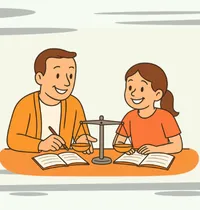
I believe that our role as tutors is to explain things in a way that works for the children we are working with in that moment.
Tough love doesn’t always work. Especially if a child already questions their own abilities.
Sometimes we just need to give them the answer. I can remember at primary school we had to create a piece of work about the Antarctic to mount and put on the wall. I wrote it in pencil and showed it to the teacher. “Ok, well now write it in pen”. That was generally code for there’s no mistakes.
Having done so, I took it back up for approval. She looked at it and said quite loudly, “What’s a farter? You’ll need to do it again.”
I couldn’t think of how you did spell father. So, I rewrote it with what I thought was the correct spelling and tried again. I don’t know how many attempts it took to get it right, but I do remember her parting shot was: “you’re not as clever as your brother are you”.
It didn’t motivate me to work harder; it just reinforced my incapability's.
📚 Break learning into ‘do-able’ chunks
You may find it worthwhile breaking the work into smaller tasks so that you can regularly celebrate successes. We often create games to help us to work through tasks, so we might play a pairs game – matching the question to the correct answer as this offers scaffolding at the beginning of the task.
Or, we might play a board game so that as you move around the board each square has a different relevant question written on there for you to tackle. That way the onus is as much on the game as it is the academic subject.
Offer choices
What I will often do is lay the various resources out, explain each one and ask which they would like to start with. Sometimes I will make a suggestion, other times I will leave it to them to choose. This helps to give them ownership. Giving them a greater sense of power (and confidence) from the outset.
Then once chosen it may be possible to attempt it in multiple ways:
You might listen to them read.
You might read together.
Listen to the text as an audio book.
Or, my favourite, play the dotty board game:
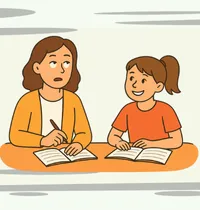
Make it fun and familiar
A lot of children struggle with reading. Especially reading out loud.
All enjoyment goes out of the story as all you can think about is the effort of what is to come. Sounding out words, recognising letters, remembering what the story was about, keeping your place in the text. And people regard this as fun, how!!
For, probably over a decade, we’ve used the ‘dotty board game’. We have a page of A4 paper and around the edge/ across the middle we have 6 yellow dots, 6 blue dots, 6 green dots. You can be green, I’ll be yellow.
You roll the dice and that determines how far you can move. You can go in any direction, but you can’t change direction halfway through a go. If your counter lands on a green, you will need to read a sentence, paragraph, page, or whatever we deem to be appropriate. If anyone lands on a yellow, I’ll have to read.
If someone lands on a blue, they roll the dice again and there is a selection of forfeits which are determined by the number on the dice:
1) have another go
2) go forward 3 spaces
3) go back 6 spaces
4) miss a turn
5) other person reads
6) you need to read again
My idea when I came up with this was to take the onus off one person having to put in all the effort as I knew as a child how I used to hate reading out. In my head, no problem. As soon as I started reading out loud, I became a bumbling buffoon. I also felt that if you never knew when your turn was coming it would mean in you had less of an opportunity to sit there in dread because you would also become too caught up in the game.
As a side note, don’t forget because it’s your favourite, it doesn’t mean that it will be their favourite too…
🤗 Create safe learning spaces
Let them know it’s okay to make mistakes, that’s how we learn.
In fact, in some cultures, making mistakes is celebrated because by working back from a mistake gives you a greater understanding of the method which can then be applied to other questions, rather than just taking a lucky guess and getting the answer to that specific question right.
Talk to them.
Work as a team.
Let them know that nobody knows everything.
Investigate things together.
Find new methods of explaining something.
The more you work together the more you will help to boost their confidence. You will create an environment where it is ok to ask questions, ok to not understand, because you are in this together, not as someone who will judge or ridicule them.
Often, like I have said before, an offhand comment, or a comment said in jest can often be dismissed by the person who said it. But remember, to the person who it is aimed at, that comment will often leave a mental scar for years. Be careful of the words you use, they are powerful weapons for both love and war.
Avoid comparing them to others, especially siblings.
I was often compared to my brother when we were young. Sometimes I’m sure those phrases like: “he might be good at (insert almost anything into this space) but you make a lovely mother playing with your dolls” were meant as compliments, but even at a young age you felt they were almost grasping at straws.
We are all unique. Jase (my brother) and I are completely different individuals. I have 3 children. All adults now, but again they are all completely different. So, I am quite opinionated that if us 5 are all so different, how you expect that every child, every person will understand things the same way. Especially in a class of 30(+).
We can’t compare our children, good or bad, because they are a completely unique individuals and by making that comparison you are instantly creating a goal for the other person to compete with. And we will all excel in different ways but knowing that was the goal that was put up by someone in some area, still leaves that feeling of failure, knocking our confidence when either one of the siblings doesn’t “live up to expectations”.
Be patient — confidence takes time
As mentioned previously, a simple word can cut deep, and it may take years for a child to regain that confidence. Reprimanding them for their inabilities, for not getting it, for a silly mistake, for taking too long, can be so damaging.
As educators, we need to learn patience. We need to let them know that whatever happens we are there for them. We will catch them should they fall.
I often use the analogy of when a baby first starts to learn to walk. We hold both their hands, and we are there with them every step of the way. We praise every step and celebrate it out loud, with pure and genuine pride.
Then slowly they gain confidence, and they let go of one of our hands. We are in awe of what they are doing, but we remain closely by their side holding that other hand just in case they need us.
Then one day they let go altogether and they no longer need us. They have the confidence and the ability to walk, to run without us. From that moment, they never look back.
Academic learning is no different. We need to provide that safety net whilst it is needed.
Remember that everyone learns differently, we are all unique individuals and that is ok. In fact, that is more than ok.
🎯 Bring in supportive tools or people when needed
If there are things that you can provide (that metaphorical hand as they start to toddle by themselves) try to provide it because they won’t always need it.
It might be another approach to looking at the question, a hint at the answer, how to pronounce the word, the times tables written out for them to refer to.
Make the steps they need to take to thrive small and achievable and their confidence will grow. They will learn self-belief.
Remember support is a strength, not a failure.
If this article has given you some ideas or hope, hold on to that. Confidence doesn’t grow overnight, but it can grow with support, patience, and a little creativity.
If you’d like more gentle strategies like these, you might want to check out the Clara James Approach where we have a range of different resources/games to support children’s learning.
They are aimed at children working at a primary school level (up to the age of roughly 11).
There is also a monthly zoom call where you can ask for specific help and a Facebook group where you can celebrate your wins and successes.
You're not alone in this, and you're doing more than you think.
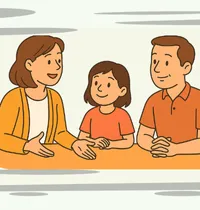
Talk openly with the tutor beforehand and gauge their attitude toward supporting your child, their willingness to be flexible, and their approach to different learning styles.
Copywrite: Clara James Tutoring 2025
